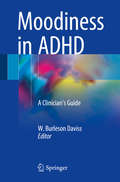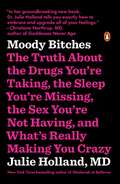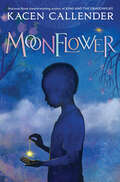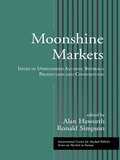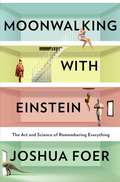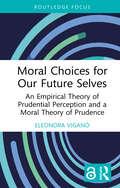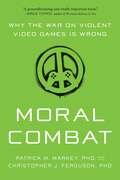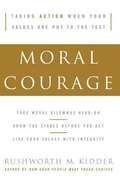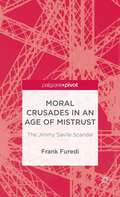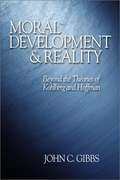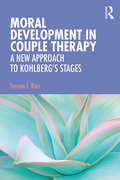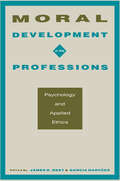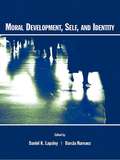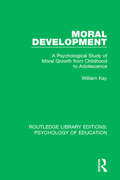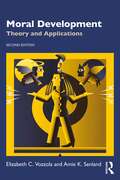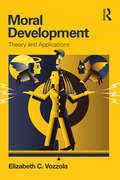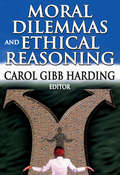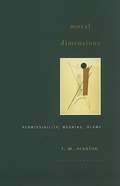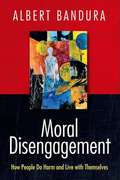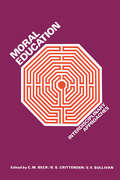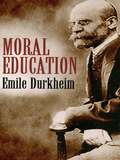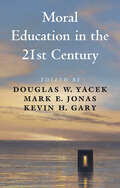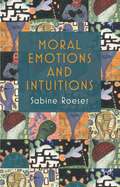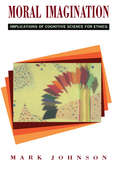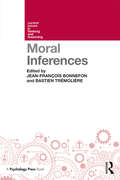- Table View
- List View
Moodiness in ADHD
by W. Burleson DavissThis book gives clinicians a framework and tools to accurately assess moodiness in patients with ADHD, and to provide the most appropriate pharmacological and psychosocial treatments for such problems. This book reviews the assessment and treatment of moodiness in ADHD patients of all ages, but focuses primarily on children and adolescents. Chapters review effective assessment strategies for various potential causes of moodiness in patients with ADHD, then psychosocial and pharmacological treatments and their empirical basis. Specific chapters are devoted to the moodiness characteristic of ADHD itself, and to other disorders co-occurring with it such as disorders of mood, anxiety, trauma-exposure, disruptive behaviors, autism, substance use, and medical problems. The also text includes useful case summaries and tables to illustrate key clinical points useful in working with these patients. Moodiness in ADHD is a potentially vital resource for clinicians wanting to improve their skill working with patients having these challenging problems.
Moody Bitches: The Truth About the Drugs You're Taking, The Sleep You're Missing, The Sex You're Not Having, and What's Really Making You Crazy
by Julie HollandA groundbreaking guide for women of all ages that shows women's inherent moodiness is a strength, not a weakness As women, we learn from an early age that our moods are a problem. Bitches are moody. To succeed in life, we are told, we must have it all under control. We have to tamp down our inherent shifts in favor of a more static way of being. But our bodies are wiser than we imagine. Moods are not an annoyance to be stuffed away. They are a finely-tuned feedback system that, if heeded, can tell us how best to manage our lives. Our changing moods let us know when our bodies are primed to tackle different challenges and when we should be alert to developing problems. They help us select the right tool for each of our many jobs. If we deny our emotionality, we deny the breadth of our talents. With the right care of our inherently dynamic bodies, we can master our moods to avail ourselves of this great natural strength. Yet millions of American women are medicating away their emotions because our culture says that moodiness is a problem to be fixed. One in four of us takes a psychiatric drug. If you add sleeping pills to the mix, the statistics become considerably higher. Over-prescribed medications can have devastating consequences for women in many areas of our lives: sex, relationships, sleep, eating, focus, balance, and aging. And even if we don't pop a pill, women everywhere are numbing their emotions with food, alcohol, and a host of addictive behaviors that deny the wisdom of our bodies and keep us from addressing the real issues that we face. Dr. Julie Holland knows there is a better way. She's been sharing her frank and funny wisdom with her patients for years, and in Moody Bitches Dr. Holland offers readers a guide to our bodies and our moodiness that includes insider information about the pros and cons of the drugs we're being offered, the direct link between food and mood, an honest discussion about sex, practical exercise and sleep strategies, as well as some surprising and highly effective natural therapies that can help us press the reset button on our own bodies and minds. In the tradition of Our Bodies, Our Selves, this groundbreaking guide for women of all ages will forge a much needed new path in women's health--and offer women invaluable information on how to live better, and be more balanced, at every stage of life.
Moonflower
by Kacen CallenderKacen Callender, National Book Award winner of King and the Dragonflies, delivers a stunning novel that invites readers into a child’s struggles with mental health, and their journey to wholeness. Moon’s depression is overwhelming. Therapy doesn’t help, and Moon is afraid that their mom hates them because they’re sad. Moon’s only escape is traveling to the spirit realms every night, where they hope they’ll never return to the world of the living again.The spirit realm is where they have their one and only friend, Wolf, and where they’re excited to experience an infinite number of adventures. But when the realm is threatened, it’s up to Moon to save the spirit world.With the help of celestial beings and guardians, Moon battles monsters and shadows, and through their journey, they begin to learn that a magical adventure of love and acceptance awaits them in the world of the living, too.This story of hope shows readers that our souls blossom when we realize that we are as worthy and powerful as the universe itself.
Moonshine Markets: Issues in Unrecorded Alcohol Beverage Production and Consumption (ICAP Series on Alcohol in Society)
by Alan Haworth Ronald SimpsonThis text reports on patterns of consumption of non-branded alcohol in seven countries: Brazil, India, Mexico, Russia, Tanzania, Zambia and Zimbabwe. Using local consultants, investigators interviewed families in each country, in both rural and urban areas, on the subject of their drinking habits over a thirty-day period giving specific attention to their religious, educational and socio-economic status. Experts in the fields of toxicology, economics, and anthropology as well as representatives of the beverage industry give commentary on the common themes emerging from the collected data.
Moonwalking with Einstein: The Art and Science of Remembering Everything
by Joshua FoerThis book draws on cutting-edge research, a surprising cultural history of memory, and venerable tricks of the mentalist's trade to transform our understanding of human remembering. Moonwalking with Einstein brings Joshua Foer to the apex of the U.S. Memory Championship and readers to a profound appreciation of a gift we all possess but that too often slips our minds.
Moral Choices for Our Future Selves: An Empirical Theory of Prudential Perception and a Moral Theory of Prudence (Routledge Focus on Philosophy)
by Eleonora ViganòThis book investigates the relationship between our present and future selves. It focuses specifically on diachronic self-regarding decisions: choices involving our earlier and later selves, in which the earlier self makes a decision for the later self. The author connects the scientific understanding of the neurobehavioral processes at the core of individuals’ perceptions of their future selves with the philosophical reflection on individuals’ moral relationship with their future selves. She delineates a descriptive theory of the perception of the future self that is based on empirical evidence and that systematizes and integrates the current theoretical literature. She then argues for the morality of prudence and interprets diachronic self-regarding decisions as decisions between two agents— the earlier and later selves—that belong to the realm of intergenerational ethics, which regulates the relationship between contemporary people and future generations. Finally, the author provides a moral theory of prudence based on respect for one’s agency. This theory identifies what the present and the future selves owe to one another in diachronic self-regarding decisions. Moral Choices for Our Future Selves will be of interest to scholars and students working in ethics, moral psychology, philosophy of mind, and cognitive science.
Moral Combat: Why the War on Violent Video Games Is Wrong
by Christopher J. Ferguson Patrick M. MarkeyIn family rooms across America, millions of children and teenagers are playing video games, such as Call of Duty, Halo, and Grand Theft Auto, roaming violent virtual worlds—with virtual guns in their hands. In what sometimes seems like an increasingly violent world, it's only natural to worry about the effects of all this pixelated gore. But is that concern misplaced? Authors and psychologists Patrick M. Markey and Christopher J. Ferguson say it is. The media and politicians have been sounding the alarm for years, and with every fresh tragedy involving a young perpetrator comes another flurry of articles about the dangers of violent media. The problem is this: Their fear isn't supported by the evidence. In fact, unlike the video game–trained murder machines depicted in the press, school shooters are actually less likely to be interested in violent games than their peers. In reality, most well-adjusted children and teenagers play violent video games, all without ever exhibiting violent behavior in real life. What's more, spikes in sales of violent games actually correspond to decreased rates of violent crime. If that surprises you, you're not alone—the national dialogue on games and violence has been hopelessly biased. But that's beginning to change. Scholars are finding that not only are violent games not one of society's great evils, they may even be a force for good. In Moral Combat, Markey and Ferguson explore how video games—even the bloodiest—can have a positive impact on everything from social skills to stress, and may even make us more morally sensitive. Tracing the rise of violent games from arcades to online deathmatches, they have spent years on the front lines of the video game debate and now offer a comprehensive overview of the scientific research on gaming. With humor, complete honesty, and extensive research, they separate the myth from the medium. Moral Combat is an irreverent and informative guide to the worries—and wonders—of our violent virtual world.
Moral Courage
by Rushworth M. KidderIn a book rich with examples, Rushworth Kidder reveals that moral courage is the bridge between talking ethics and doing ethics. He explains that the courage to act is found at the intersection of three elements: action based on core values, awareness of the risks, and a willingness to endure necessary hardship. He demonstrates the benefits of ethical action to the individual and to society -- and the severe consequences that can result from remaining morally dormant.
Moral Crusades in an Age of Mistrust: The Jimmy Savile Scandal
by Frank FurediThe epidemic of scandals unleashed by the Savile Scandal highlights the precarious status of relations of trust. The rapid escalation of this crisis offers insights into the relationship between anxieties about childhood and the wider moral order. This book explains why western society has become so uncomfortable with the exercise of authority.
Moral Development and Reality: Beyond the Theories of Kohlberg and Hoffman
by John C. GibbsMoral Development and Reality elucidates the full range of moral development from superficial perception to a deeper understanding and feeling through social perspective-taking. Providing case studies and chapter questions, Gibbs creates a unique framework for understanding Kohlberg's and Hoffman's influential contributions.
Moral Development in Couple Therapy: A New Approach to Kohlberg's Stages
by Steven I. RiesThis innovative text utilizes Kohlberg’s stages of moral development, demonstrating how they can be effectively applied to couple and marriage therapy. Facilitating moral stage development has been found to improve couples’ ability to relate to one another, enhancing trust, transparency, communication, and intimacy. Based on empirical research and Kohlberg’s classic stages of development, the book showcases the Conceptual Template, a tool for therapists to guide their clients in thinking more objectively about the reality being experienced, their own subjectivity, and how to work together as a couple to mindfully solve problems. With an extensive Instructional Manual as well as a transcript of the author teaching the Conceptual Template process to a therapist, Moral Development in Couple Therapy illustrates a highly practical approach to counseling that helps couples achieve a more rational level of moral judgment and reasoning. Filled with practical case studies and written in an accessible manner, this text is an indispensable resource for couple therapists and other mental health professionals working with couples to resolve conflict. .
Moral Development in the Professions: Psychology and Applied Ethics
by James R. Rest Darcia Narv Nbsp EzEvery year in this country, some 10,000 college and university courses are taught in applied ethics. And many professional organizations now have their own codes of ethics. Yet social science has had little impact upon applied ethics. This book promises to change that trend by illustrating how social science can make a contribution to applied ethics. The text reports psychological studies relevant to applied ethics for many professionals, including accountants, college students and teachers, counselors, dentists, doctors, journalists, nurses, school teachers, athletes, and veterinarians. Each chapter begins with the research base of the cognitive-developmental approach--especially linked to Kohlberg and Rest's Defining Issues Test. Finally, the book summarizes recent research on the following issues: * moral judgment scores within and between professions, * pre- and post-test evaluations of ethics education programs, * moral judgment and moral behavior, * models of professional ethics education, and * models for developing new assessment tools. Researchers in different professional fields investigate different questions, develop different research strategies, and report different findings. Typically researchers of one professional field are not aware of research in other fields. An important aim of the present book is to bring this diverse research together so that cross-fertilization can occur and ideas from one field can transfer to another.
Moral Development, Self, and Identity
by Darcia Narvaez Daniel K. LapsleyThis volume examines the psychological, social-relational, and cultural foundations of the most basic moral commitments. It begins by looking at the seminal writings of Augusto Blasi, whose writings on moral cognition, the development of self-identity, and moral personality have transformed the research agenda in moral psychology. This work is now the starting point of all discussion about the relationship between self and morality; the developmental grounding of the moral personality; and the moral integration of cognition, emotion, and behavior. Indeed, it is now widely believed that organizing self-understanding around basic moral commitments is crucial to the formation of a moral identity which, in turn, underwrites moral conduct. Using Blasi's work as a point of departure, a distinguished interdisciplinary and international group of scholars have contributed essays summarizing their own theoretical and empirical research on these topics. This book features new theories of moral functioning that range across several psychological literatures, including social cognition, cognitive science, and personality development. Examining the social-relational, communitarian, and cultural aspects of moral self-identity, it provides a comprehensive account of moral personality. Uniformly integrative, field-expanding, and on the cutting edge of research on moral development and personality, the book appeals to scholars, developmental theorists and graduate students interested in issues of moral development, education, and behavior, as well as cognitive development theory.
Moral Development: A Psychological Study of Moral Growth from Childhood to Adolescence (Routledge Library Editions: Psychology of Education)
by William KayAlthough the work of Piaget dealt with the intellectual development of children, and that of Goldman with a child’s religious thought, there had hitherto been no comparable book on child morality to complete the developmental picture of the time. Originally published in 1968 William Kay’s book was designed to fill this gap, for he offers a complete description of the moral growth of children from infancy to adolescence. Dr Kay was writing specifically for students and practising teachers and carefully avoids specialist jargon where ordinary terms suffice. He concludes that the findings of research into attitude formation and change could provide teachers with those techniques to help their pupils become morally mature members of society. His book contains a valuable analysis of the development of ideas concerning moral growth, and is a bold contribution to the problems of moral education.
Moral Development: Theory and Applications
by Elizabeth C. Vozzola Amie K. SenlandMoral Development offers a comprehensive overview of classic and current theories of moral development and applications of these theories in various counseling and educational settings. It examines changes across time and experience in how people understand right and wrong, and individual differences in moral judgements, emotions, and actions. Elizabeth C. Vozzola and Amie K. Senland review the latest research in the field and integrate classic work with contemporary perspectives on assessment and treatment. Part 1 provides an understanding of a range of theories, explaining their strengths and challenges, and offering examples of how these theories apply to helping professionals. It covers Freud, Piaget, Kohlberg, Rest, Gilligan, Nodding, Bandura, Turiel, Nucci, Narvaez, Haidt, and Shweder. Part 2 highlights promising applications of moral development theory in education and counseling. Fully updated with new chapters on faith development and moral and prosocial development in infancy and early childhood, the text explores specific approaches to helping clients with a variety of clinical or developmental challenges and provides an excellent resource for courses addressing the CACREP program objectives for Human Growth and Development. It also integrates issues of gender, ethnicity, and culture throughout to prepare readers for practicing in a global culture and presents a new perspective: the cultural developmental approach. Illustrated throughout with examples that highlight applications of moral development concepts in today’s media, it also includes interviews from some of today’s leading theorists and practitioners. Ideal as a text for advanced courses on moral development and moral psychology, as well as courses on human, child, social and personality development taught in psychology, counseling, education, human development, family studies, social work, and religion. Its applied approach also appeals to mental health and school counselors.
Moral Development: Theory and Applications
by Elizabeth C. VozzolaA CHOICE Outstanding Academic Title 2014! This class-tested text provides a comprehensive overview of the classical and current theories of moral development and applications of these theories in various counseling and educational settings. Lively and accessible, this text engages students through numerous examples and boxes that highlight applications of moral development concepts in today’s media and/or interviews from some of today’s leading theorists or practitioners. Dilemma of the Day boxes help readers apply theory to real world situations. Each chapter concludes with discussion questions and further resources. Summary tables of theory strengths and weaknesses (Part 1) and tables that connect applications to their theoretical roots are provided in Part 2. Other highlights include: Provides an excellent resource for courses addressing the CACREP program objectives for Human Growth and Development. Emphasis on application helps readers make the connection between theory and moral issues of our time. Examines changes across time and experience in how people understand right and wrong and individual differences in moral judgments, emotions, and actions. Demonstrates how theory is used by today‘s helping professionals (Part 1). Integrates issues of gender and ethnicity throughout to prepare readers for practicing in a global culture. Chapter on global perspectives (ch. 6) reviews theories on the cultural aspects of morality including examples from China, Islam, Latin America, and Africa. Reviews the latest research methods techniques used in the field. Integrates classic work with contemporary guidelines for assessment and treatment. Highlights research on the moral and empathic development of antisocial youth, psychopaths, and individuals diagnosed on the Autism Spectrum. Each chapter in Part 1 provides a comprehensive overview of the theory under review, its strengths and challenges, and examples of how the theory applies to helping professionals. The theories covered include those by Freud, Piaget, Kohlberg, Rest, Gilligan, Nodding, Bandura, Turiel, Nucci, Haidt, and Shweder. Part 1 concludes with a summary of the key points and the strengths and weaknesses of each of the theories reviewed. Part 2 highlights promising applications of moral development theory in education and counseling. These include coverage of character education programs based on sound developmental theory and examples of how drawing on a deep grounding in moral development theory can help future counselors better evaluate their clients’ cognitive, emotional and behavioral challenges. The text explores specific approaches to helping clients with a variety of dysfunctional or developmental behavior problems like conduct disorder and psychopathy. Ideal as a text for advanced undergraduate and/or graduate courses on moral development or moral psychology or as a supplement in courses on human and/or child and/or social and personality development taught in psychology, counseling, education, human development, family studies, social work, and religion, this book’s applied approach also appeals to mental health and school counselors.
Moral Dilemmas and Ethical Reasoning
by Carol Gibb HardingThis book deals with moral dilemmas and the development of ethical reasoning in two senses. First, the editor focuses on dilemmas, both real and hypothetical, which require moral judgments. The ""Heinz dilemma,"" part of Kohlberg's scoring system for level of moral development, is in some cases used as a point of departure for discussion. Problems with this particular dilemma as a scoring item are examined in detail, along with problems generated by similar dilemmas for moral reasoning in everyday life.Those who study moral reasoning and its development are in somewhat of a dilemma as they attempt to integrate information from the domains of philosophy and psychology. These essays investigate domain issues in varied cultural settings, and across genders and age ranges for what have been proposed as universals in moral judgment, as well as formulate theories that reflect both empirical evidence and logical process.The essays share a conception of human nature as inherently social, as well as a healthy respect for the problems or dilemmas which human sociality carries in its wake. Some of these problems are theoretical, such as those having to do with the moral reasoning or the classic issues of values justification. Other problems are practical, such as those having to do with distributive justice or methods of moral education. This volume will shed light on the process of resolving dilemmas both within philosophy and psychology.
Moral Dimensions: Permissibility, Meaning, Blame
by T. M. ScanlonScanlon reframes current philosophical debates as he explores the moral permissibly of an action. Blame, he argues, is a response to the meaning of an action rather than its permissibly. This analysis leads to a novel account of the conditions of moral responsibility and to important conclusions about the ethics of blame.
Moral Disengagement: How People do Harm and Live with Themselves
by Albert BanduraThey do so by sanctifying their harmful behavior as serving worthy causes; they absolve themselves of blame for the harm they cause by displacement and diffusion of responsibility; they minimize or deny the harmful effects of their actions; and they dehumanize those they maltreat and blame them for bringing the suffering on themselves.
Moral Education
by Edmund Sullivan Clive M. Beck Brian S. CrittendenThis volume, based on an interdisciplinary conference of psychologists, sociologists, philosophers, and social scientists, explores a topic of vital importance today---moral education. The book is organized around four questions: the nature and scope of moral education, the problem of ethical pluralism, psychological considerations in a program of moral education, and the social structure of the school as it relates to moral education. This volume will interest philosophers and social scientists concerned with human behaviour and values. It will be of special interest to those engaged in educational research, to curriculum planners, and teachers.
Moral Education
by Émile DurkheimThe great French sociologist and philosopher Emile Durkheim is best known for his classic book Suicide (1897), a landmark in social psychology. Among his other major works is this study in the sociology of education, which features 18 lectures by an influential theorist who discusses his ideas on the school as the appropriate setting for moral education. The first element in developing a moral being, he maintains, is instilling a sense of discipline, followed by a willingness to behave in terms of the group's collective interest, and a sense of autonomy. Durkheim also examines discipline and the psychology of the child, discipline of the school and the use of punishment, altruism in the child, the influence of the school environment, and the teaching of science, aesthetics, and history. Perceptive and provocative, this volume abounds in valuable insights for teachers and others involved in education.
Moral Education in the 21st Century
by Mark E. Jonas Douglas W. Yacek Kevin H. GaryMoral education is an enduring concern for societies committed to the value of justice and the wellbeing of children. What kind of moral guidance do young people need to navigate the social world today? Which theories, perspectives, values, and ideals are best suited for the task? This volume offers educators insight into both the challenges and promises of moral education from a variety of ethical perspectives. It introduces and analyses several important developments in ethics and moral psychology and discusses how some key moral problems can be addressed in contemporary classrooms. In doing so, Moral Education in the 21st Century helps readers develop a deeper understanding of the complexities of helping young people grow into moral agents and ethical people. As such, researchers, students, and professionals in the fields of moral education, moral psychology, moral philosophy, ethics, educational theory, and philosophy of education will benefit from this volume.
Moral Emotions and Intuitions
by Sabine RoeserThe author presents a new philosophical theory according to which we need intuitions and emotions in order to have objective moral knowledge, which is called affectual intuitionism. Affectual Intuitionism combines ethical intuitionism with a cognitive theory of emotions.
Moral Imagination: Implications of Cognitive Science for Ethics
by Mark JohnsonUsing path-breaking discoveries of cognitive science, Mark Johnson argues that humans are fundamentally imaginative moral animals, challenging the view that morality is simply a system of universal laws dictated by reason. According to the Western moral tradition, we make ethical decisions by applying universal laws to concrete situations. But Johnson shows how research in cognitive science undermines this view and reveals that imagination has an essential role in ethical deliberation. Expanding his innovative studies of human reason in Metaphors We Live By and The Body in the Mind, Johnson provides the tools for more practical, realistic, and constructive moral reflection.
Moral Inferences (Current Issues in Thinking and Reasoning)
by Bastien Trémolière Jean-Francois BonnefonMoral Inferences is the first volume to thoroughly explore the relationship between morality and reasoning. Drawing on the expertise of world-leading researchers, this text provides ground-breaking insight into the importance of studying these distinct fields together. The volume integrates the latest research into morality with current theories in reasoning to consider the prominent role reasoning plays in everyday moral judgements. Featuring contributions on topics such as moral arguments, causal models, and dual process theory, this text provides a new perspectives on previous studies, encouraging researchers to adopt a more integrated approach in the future. Moral Inferences will be essential reading for students and researchers of moral psychology, specifically those interested in reasoning, rationality and decision-making.
